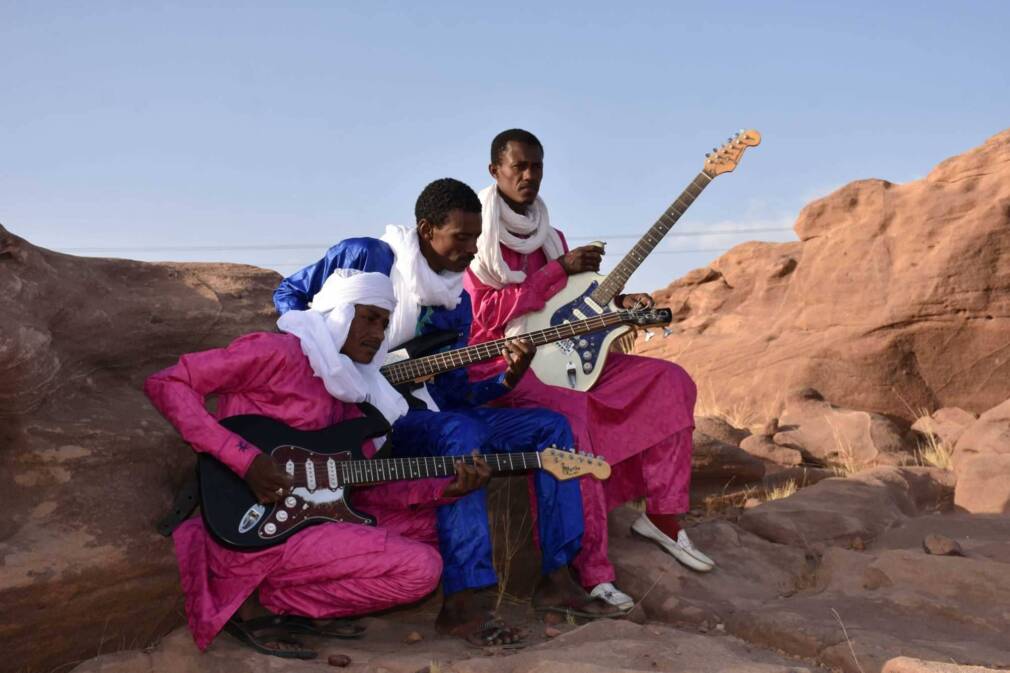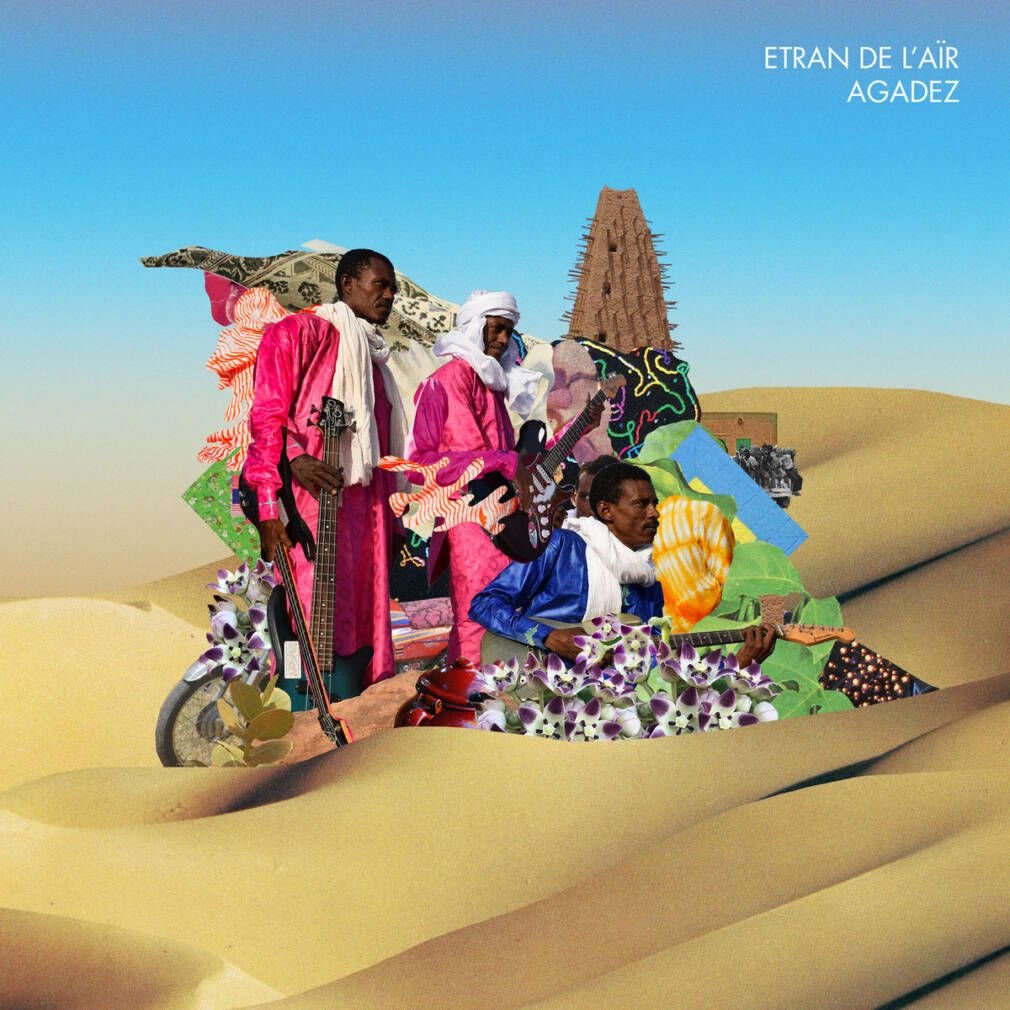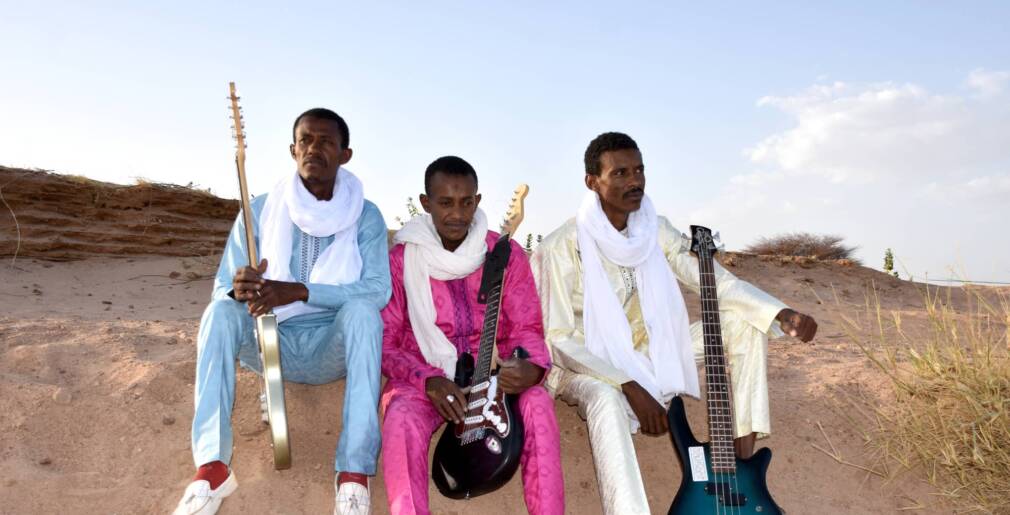There are three of them carrying Fender amps, three of them setting up the guitars and the drum set on the stage. But there should have been four of them, four “Stars of Aïr” (the English translation of the group’s name, in reference to the stars that shine over the Sahara massif). There should have been four of them for their first trip away from their desert home, like four musketeers united for over 25 years : united to find guitars that sound good, united to buy instruments in Libya or Nigeria, united to tinker with inadequate amps and musical dreams, united like a family that has navigated the hazards of rock music and dunes, the brutal competition of Agadez’s wedding orchestras, and united to even evade musical espionnage and marabout magic spells, in order to finally be able to leave Niger. But the labyrinths of the bureaucracy for obtaining visas hide their ultimate mysteries. And, for whatever the reasons, one of the musicians was not given his sesame to go to Europe. “So we’re doing whatever it takes with what we have ! We take turns on the instruments in order to be able to play the concerts. It’s so incredible to be here!” says jubilant Abindi when he arrives at the Instants Chavirés in Montreuil, one of the thirty concert halls that Etran de l’Aïr rocked on their first trip ot Europe, a hugely successful tour full of miracles, considering the sanitary issues and the number of borders crossed (Sweden, Denmark, Switzerland, Belgium, Holland, France, etc).
Call for Aïr
Abindi hasn’t had much sleep with all the concerts and mileage on this long tour, but when he plugs in his guitar, the sounds light up his face. He smiles : “It sounds even better here than in the desert !” In Agadez the group obviously doesn’t have the chance to play with state of the art sound systems like the one at the Instant Chavirés. At home, the challenge for Etran is to adapt to the equipment provided at weddings, big social events which usually last three days (the time it takes for the young bride to be led to her husband). And in the competitive jungle of Agadez, where a wedding performance often means playing for six hours non-stop for a fee of 100,000 CFA (approximately 150 euros for the evening), Etran de l’Aïr has made its name as one of the most creative groups in the city, and one that always insists on playing their own songs rather than covers and traditional tunes. Etran de l’Aïr also stands out for its influences, which extend beyond the local Tamachek, Zarma or Haussa repertoires to include music from other regions (Congolese soukouss, Ali Farka Touré, the rhythms of Oumou Sangaré’s Malian Wassoulou…).
But above all, Etran de l’Aïr has people dancing with its unstoppable rhythms and not one but TWO solo guitars in constant dialogue! “In Niger, we are the only ones working this way”, says Abindi, “We put a lot of care into the improvisations and the arrangements, we put a lot of energy into it, so of course it’s going to work!“
This is what impressed Christopher Kirkley, owner of the wonderful label Sahel Sounds, who spotted the group in 2014 and offered to record them for the first time. “We said to him : ‘no problem’. Thanks to him, we’ve become known”, says Abindi, who met the American producer from Portland when he was producing the film Akunak with «big brother » Mdou Moctar in Niger.

Agadez, Saharan locomotive
The Sahel Sounds label has put Niger’s contemporary music scene on the international charts and made it possible for several Sahelian groups (Les Filles de Illighad, Mdou Moctar, …) to record and to tour the United States and elsewhere. And yet this success has not changed the sound of Agadez, which is still usually created with memory cards, auto-tune and Bluetooth. “There are a lot of groups in Agadez because there are a lot of weddings and divorces !” says Christopher with a smile. “When I first heard Etran de l’Aïr I immediately liked them. It’s a true ‘live’ group, a ‘group of music workers’, ready to play in front of any audience. They have the power and the incredible energy that drives the audience! The first album I produced with them was roots, recorded with just one microphone and the surrounding ambiance. For this new album I set up a mobile studio in Abindi’s home. I wanted above all to capture the dynamism of their performances without changing anything. It’s halfway between a real studio and pure live.“
The result is undeniable. The drums, like a desert locomotive, drive the hypnotic guitars, and the vocals and backing voices chronicle daily life in Agadez today ; the desert metropolis has become a crossroads of migrations, but remains as ever the capital of love and of poetry. If the sound of the new album entitled Agadez (released February 18) is both precise and warm, it is certainly because the group has been polishing its musical alchemy since adolescence and even childhood in their local neighborhood. “I began playing the guitar at the age of 9″, says Abindi. “At the time there were very few instruments in Agadez. We started out by learning to play on an acoustic guitar that a friend had brought back from Libya, and in the beginning of the group we didn’t even have a drum set, just a gourd struck with a sandal.“
At night, near the Great Mosque of Agadez, when the Abana quarter had fallen asleep, they would take turns playing the guitar until 2 or 3 in the morning. “At the time we were bachelors, we were free to play until dawn, our parents took care of everything and we didn’t even need money ! ” remembers Abindi, who also went to work in Libya and came back with a guitar… “At the time it took a week to go there. We went illegally because the government forbade it. The car dropped me off in Arlit, and from there you had to walk the rest of the way. It was hard without water. When you arrived at the border you had to wait for nightfall in order to cross, when the guard was asleep, or even better, when he was praying! If you don’t truly love music, you’re not going to go all the way to Libya just to find a guitar…” explains Abindi.
Since then, the stars of Aïr have pooled their resources in order to buy instruments in Nigeria, and currently play guitars made in China, “while waiting to be able to buy a beautiful Fender, Inch’Allah”… For this tour, Abindi wasn’t able to bring his first guitar, because “it no longer works“. In Agadez there still isn’t an instrument maker who knows how to repair electric guitars. But in this world of sand hostile to electric circuits and tight strings, Abindi has a secret to make his magical guitars last longer : “You open the guitar, you take a brush and you dip it in gasoline. You brush well and all the dirt and sand comes off. Then you have to wait 24 hours for the gasoline to evaporate before playing it again…”
Before the next clean-up of sands, Etran de l’Aïr will already have set Western galaxies on fire…
Agadez, out now on Sahel Sounds.





